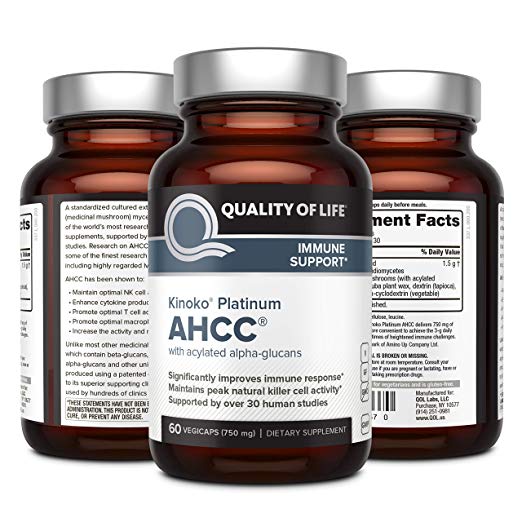When Lillian Kreppel was diagnosed with anal cancer in August 2017, she learned that the cancer was linked to a high-risk strain of HPV (human papillomavirus) that she had contracted years prior. Usually, the body's immune system fights off HPV on its own, but in some peopleas was the case for Kreppelthe infection can linger over time, causing cellular changes and eventually cancer.
Fortunately, Kreppel’s cancer was diagnosed at stage II, meaning it hadn't yet spread widely throughout her body. It was treatable, although the treatment wasn’t easy. Kreppel kept a positive attitude after her diagnosis and immediately began treatment with a combination of radiation and chemotherapy to shrink the cancer tumor.
Read MoreIn the meantime, Kreppel's gynecologic oncologist, Dr. Elizabeth Poynor, suggested Kreppel try taking a daily supplement to help regulate her immune system. The supplement, which is derived from shiitake mushrooms, is called "AHCC," which stands for "active hexose correlated compound." It's not a drug, and it hasn't been approved by a regulatory body like the U.S. Food and Drug Administration (FDA), but it has been studied in humans, including during a double-blind placebo study this past year that tested the supplement in women with persistent high-risk HPV, and found that 60 percent of the group that took the AHCC were successfully able to eradicate their infections within six months. This was a significant improvement over the expected zero-to-ten percent eradication rate for people with persistent, high-risk HPV. Other studies have tested the supplement in people who had been treated with chemotherapy and found that, as was the case for Kreppel, taking AHCC was associated with a higher white blood cell count after treatment.
In the month leading up to her hematology appointment, Kreppel started taking three AHCC pills per day. She went back to get her blood levels tested once more in the interim.
"And then three days before my hematology appointment, they called me up and they said, 'you don’t have to come in; your white blood cells are up.'" She recalled. "This stuff is not hokey pokey stupid. This is real."
What Does it Mean to Be 'Real'?
There are a lot of “hokey” supplements out there, especially in the cancer sphere. Herbal pills and vitamins with difficult-to-pronounce names often claim they can "cure cancer" without the side effects of conventional medicine like chemotherapy and radiation.
It's smart to be skeptical about these supplements and their lofty claims, and smarter yet to keep your oncologist or care provider in the loop before you decide to put a pill in your mouth that hasn't been prescribed to you by a medical professional.
It's smart, too, to keep in mind that people who choose the "alternative medicine" routethat is, using complementary medicines like herbal supplements, healing crystals, and homeopathic drugs instead of the legitimate, rigorously tested medical care that a licensed medical provider prescribes (called "conventional medicine")have, on average, a two-fold greater risk of dying.
"To take something that really doesn’t have serious data to support it… I actually think that’s not ok, and from an ethical standpoint, I have a real hard time with that," Dr. Ann Partridge, an oncologist at the Dana-Farber Cancer Institute, founder and director of the Program for Young Women With Breast Cancer, and a professor of medicine at Harvard Medical School previously told SurvivorNet during a conversation about the problematic nature of "selling hope."
Dr. Ann Partridge shared with us her concerns about supplements and complementary medicine.
All of this being said, there are some supplements out there that have been tested in humans and do have the data to support their efficacy. And while most oncologists agree it's a terrible idea to take them instead of conventional medicine, there are some cases where, if your doctor decides it's a good idea, it can be beneficial to take them alongside conventional medicine, in a harmonious approach called "integrative medicine."
“[Integrative medicine] blends the best of conventional medicine and complementary therapies,” Dr. Brian Berman, Director of the Center for Integrative Medicine at the University of Maryland School of Medicine, told SurvivorNet during a conversation about the differences between alternative, complementary, and integrative medicine. “So it’s not about ‘throwing the baby out with the bathwater.'”
This was the case for Kreppelwho approached the supplement in the right way. She only purchased it after a conversation with her doctor, who presented her with the clinical studies that showed the supplement's effects. She also kept up with her conventional medical care while taking the supplement. In other words, she approached AHCC as an added plus rather than an all-powerful alternative to conventional medicine, as many people make the mistake of doing.
AHCC and HPV
It's impressive that AHCC was able to bring Kreppels' white blood cell counts into a normal range following chemotherapy and radiation.
But perhaps more impressive yet is the fact that the supplement has shown itself capable of helping people's bodies naturally eradicate persistent, high-risk HPV, which is responsible for over 90 percent of both anal cancer and cervical cancers, as well as many tongue, throat, penile, and vaginal cancers.
Right now, there is no "cure" for HPV; people who test positive for HPV during cervical screening tests or have shown HPV-related cell changes during cervical or anal Pap smears are usually told to simply watch and wait. They're encouraged to come back for consistent testing to monitor the virus, but often, nothing happens and their body is able to eradicate the HPV on its own. But for people who have a lingering version of the virus that their body is struggling to get rid of, there isn't really much to do but try to stay healthy and hope the immune system will get rid of their infection.
Of course, it’s worth noting that there are highly effective vaccines available to prevent cancer-causing strains of HPV in the first placeand oncologists and gynecologists alike highly recommend these vaccines. But since HPV vaccination is really only effective if it’s administered before any sexual activity, and because the vaccine only entered the market in 2006, there are many people out there who were sexually active before the vaccine was an option. Many of these people may be harboring a high-risk version of the virus without knowing it.
"HPV lies dormant," Kreppel said. "It stays there. Don't think it goes awaythis virus is sneaky. This is what's happening to us in our 50s. We contracted HPV in our 20s, it laid dormant, and now it's coming out."
It is for these people that AHCC could potentially deliver a significant benefit.
AHCC: The Science
To be sure, the AHCC supplement doesn't actually get rid of the HPV itself. Instead, it helps to regulate the body's immune system, allowing it to do the eradication HPV its own.
Dr. Judith Smith, associate professor in the Department of Obstetrics, Gynecology and Reproductive Sciences at McGovern Medical School at UTHealth Houston, has been leading up the clinical studies of AHCC in human participants, and she spoke with SurvivorNet to help us understand the science behind how the supplement actually accomplishes this.
Dr. Smith explained that, rather than being an immune "booster," as many supplements claim to be, the AHCC extract works as an immune "modulator," in that is brings immune systems that are out of balance back into their normal state to effectively fight off infections (like HPV).
AHCC specifically does this by suppressing elevated levels of something called "interferon beta," which is a type of cytokine (signaling protein) in the immune system. In too-high levels, interferon beta can prevent one of its counterparts, interferon gamma, from doing its job of releasing the immune fighters (called “natural killer cells” and “cytotoxic T cells”) in clearing a chronic virus.
Dr. Smith has conducted a series of multi-phased studies to prove that AHCC worksand works for high-risk, persistent HPV specifically. The most recent study, her phase II double-blind, placebo-controlled study, was conducted in 46 patients. The next step, she said, would be to test the supplement in over 200 patients, and to really zero in on the right dose (for this study, Dr. Smith and her colleagues administered a three-gram dose).
The promising results of the AHCC studies, Dr. Smith hopes, will encourage gynecologists and gynecologic oncologists tfo suggest the supplement to their patients who test positive for HPV.
"My goal in working on AHCC supplement is to have a potential option for women or men infected with HPV to have easy access to a potentially safe and effective way to help support their immune systems to eliminate the HPV infection," Dr. Smith said, adding that because AHCC is a "unique extract" without a single active compound, it wouldn't be the type of thing that would ultimately go on to become an FDA-approved drug.
Can I Just Eat Mushrooms and Get the Same Benefits?
Not necessarily. Dr. Smith explained to us that the unique method of extracting the alpha-glucan component of the shiitake mushrooms to create AHCCwhich a company in Japan called AminoUp has developed over the course many years, is essential to reaping the benefits of the supplement. (Most mushroom extracts, she said, are made of the beta-glucan component, which doesn't have the same effects). And while there are many health benefits to eating mushrooms the conventional way, the unique molecular compound derived from the mushrooms requires this careful extraction process.
Dan Lifton, the CEO of Quality of Life (“QOL”) Labs, a company that manufactures and sells the AHCC supplement here in the U.S., also warned that, as more have learned about the unique benefits of AHCC, countless manufacturers worldwide have begun to market products that claim to be AHCC, but have not put their product through the unique extraction processmeaning they lack the benefits.
These products, which are available online (usually at a cheaper price than the real stuff) are essentially counterfeits, he said.
To evaluate whether you're buying the real stuff, Lifton recommended reading the fine print to make sure the supplement comes from AminoUp. He also recommended looking for the trademark symbol following the acronym, "AHCC," rather than the spelled-out version of the name, "active hexose correlated compound."

Lifton, who calls himself a skeptic by nature, admitted that when it comes to supplements, "marketing is way ahead of science."
"In my view, there's no such thing as 'alternative medicine,'" he said. "There's either proven, or unproven."
The unique, clinically tested AHCC compound (not the mushroom alone, or the supplements that claim to be AHCC but actually aren't) he said, is proven. The data is there; it works.
Of course, having said that, it's important to keep in mind that there's more research to be done, and as a supplement, AHCC will never have the same amount of evidence behind it as an FDA-approved drug does.
And as Dr. Partridge reminded us when she spoke about her concerns in regard to supplements, "When someone’s putting something into their body, it might interact with something that I'm recommending as an oncologist [to treat cancer] and it might get in the way of that working, or increase the side effects from that treatment." While testing (and years and years of well-tolerated use in Japan) has shown that AHCC has safe, it hasn't ruled out every possible interaction with other drugs or supplements.
With all of this in mindand this is the case with any supplementit's absolutely vital that you talk to your doctor before taking AHCC. Because cancer or no cancer, HPV or no HPV, every person is different. Only your doctor can help you decide if adding a supplement like AHCC to your care is a good idea given your specific medical situation.
Learn more about SurvivorNet's rigorous medical review process.


